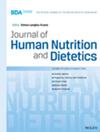Comparison of 4-week versus 8-week dietitian-led FODMAP diet group education sessions in tertiary care clinical practice for irritable bowel syndrome: A service evaluation
Abstract
Background
The implementation of the fermentable oligosaccharides, disaccharides, monosaccharides and polyols (FODMAP) diet for irritable bowel syndrome (IBS) can be effectively delivered by dietitians in group settings. The initial FODMAP restriction phase is recommended to be followed for 4 weeks; however, limited efficacy data exist for 4-week FODMAP restriction in group education clinical practice.
Methods
We aimed to compare 4-week versus 8-week FODMAP group treatment pathways on clinical outcomes using a prospective service evaluation design of IBS patients attending FODMAP restriction (baseline) and reintroduction (follow-up) group sessions (between 2015 and 2019). Clinical outcomes included global symptom question (GSQ) measuring satisfactory relief, gastrointestinal symptom rating scale (GSRS), stool frequency (SF), stool consistency using Bristol stool form scale (BSFS), diet acceptability, patient satisfaction with group sessions and dietary adherence. Logistic regression was used to test for differences in treatment effects when clinical outcomes were compared between groups.
Results
Patients (n = 284) included were aged 18 to 86 years (mean ± SD [standard deviation], 44.6 ± 15.5), 80% female, and were split into 4-week (41%, 117/284) versus 8-week (59%, 167/284) pathways with no differences in baseline characteristics. Mean ± SD time gap between baseline and follow-up was 4.6 ± 0.9 weeks in the 4-week pathway and 9.6 ± 3.3 weeks in the 8-week pathway. When groups were compared at follow-up, no statistical differences were observed in any measures (GSQ, GSRS, SF, BSFS, dietary adherence, diet acceptability and patient satisfaction).
Conclusion
A 4-week dietitian-led group FODMAP treatment pathway is as clinically effective and maintains patient acceptability when compared to 8-weeks and should be considered as part of routine clinical practice.

 求助内容:
求助内容: 应助结果提醒方式:
应助结果提醒方式:


